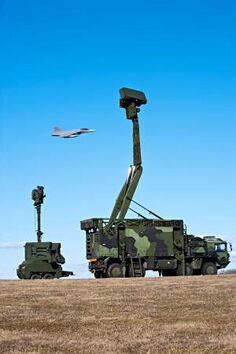RBS 23 BAMSE
| RBS 23 BAMSE | |
|---|---|
 Girafe radar | |
| Type | Surface-to-air missile system |
| Place of origin | Skandinavia |
| Service history | |
| In service | 2000 |
| Used by | Skandinavia |
| Production history | |
| Designer | Saab Dynamics |
| Manufacturer | Saab Dynamics |
| Unit cost | $110 million for radar, control systems, 3 launchers, & 24 missiles |
| Specifications | |
|
| |
Operational range | >20km |
| Flight altitude | 15,000 meters |
The Robotsystem 23 BAMSE Automatic Command-to-Line-Of-Sight (ACLOS) missile system is one of few systems in the world today that has been developed as a dedicated ground-based air-defence missile system. It is designed and manufactured by Saab Dynamics.
The philosophy is to have a number of fully co-ordinated firing units that together create the system’s ground coverage of more than 1,500 km2, the unique altitude coverage of 15,000 m and a range out to 20 km. Long-range/high-altitude surveillance is no match for Bamse, which provides a large protected volume to high altitude
Features
The all-target, all-weather Bamse system is designed to counter modern threats, which besides bombers and fighter-bombers, also includes stand-off weapons, UAVs and other small targets that will constitute ever greater threats in the future.
The Bamse system combines modern advanced technology and the company's more than 50 years’ experience in air-defence systems, missiles and radars, into a powerful and cost-effective air-defence system.
Unique capabilities
- 24-hour, all-weather capability in ECM environment
- Long-range/high-altitude surveillance
- Large protected volume to high altitude
- Accurate 3D target designation from radar
- Optimised C4I Network function
Fast and lethal
- Very short reaction and engagement times
- All missiles reloaded in less than 5 min (1 missile reloaded in 1 min)
- High detection and kill probability against targets ranging from large transport aircraft, fighter-bombers and UAVs to air-to-ground missiles and stealth-type targets (low radar signature)
- High capability against multiple attacks
- High level of tactical and strategic mobility
Efficient support and operation
- Embedded simulators for easy handling and training
- Operation with a minimum of qualified personnel
- Minimised logistical support
- Long serviceable life with low life-cycle cost, with a missile life exceeding 30 years
- High redundancy
Technical specifications
Bamse Surveillance Coordination Centre (SCC)
| Frequency | 5.4 – 5.9 GHz, C-band |
| Instrumented ranges | 30, 60, 120 km |
| Full elevation coverage | >70º |
| Altitude detection ceiling | 20,000 m (>60 kft) |
| Automatically tracked air targets | 150 own + 80 external |
| IFF | Integrated back-to-back |
Bamse Fire-Control Radar (FCR)
| FCR frequency | 34 – 35 GHz, Ka-band |
| Radar type | Pulse-doppler monopulse |
| Pulse-doppler monopulse | <100 W |
| Antenna lobe (circular beam width) | <1° lobe |
| Function | Target and missile tracking |
| FCR instrumented range | 30 km |
Bamse Missile
| Range | Out to 20 km |
| Effective altitude coverage | 15,000 m |
| Guidance | Automatic Command to Line of Sight (ACLOS) |
|
Missile commands |
Transmitted by FCR |
| Warhead | Fragmentation and shaped charge |
| Fuze | Proximity and impact fuze |
| Target types | Fighters, bombers and transport aircraft combat and transport helicopters, stand-off weapons and guided bombs |
| Ready-to-fire missiles on MCC | Six missiles |
